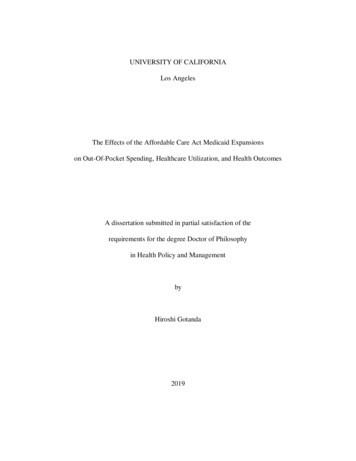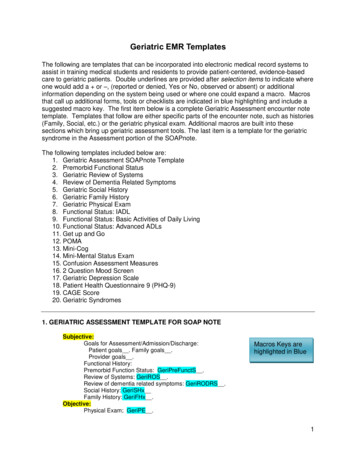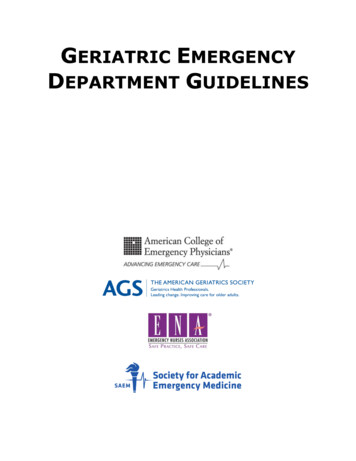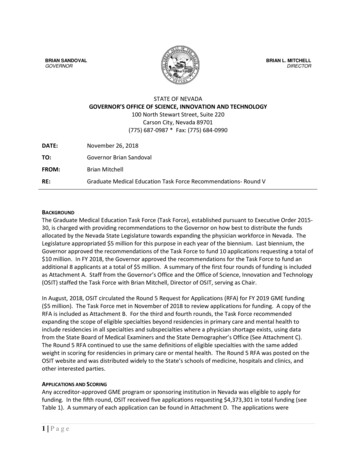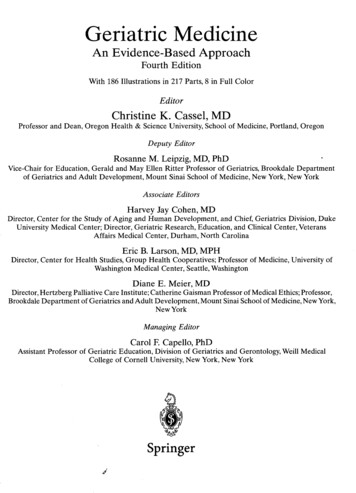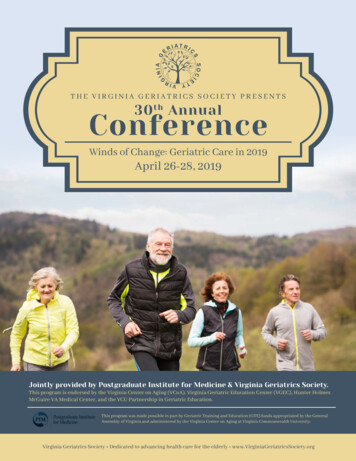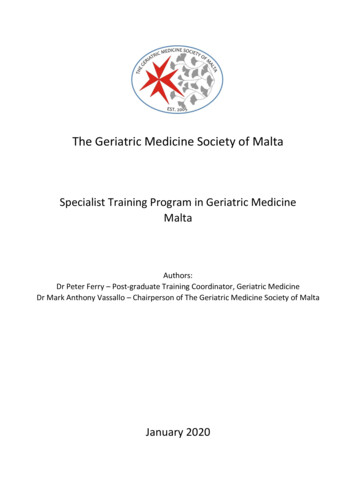
Transcription
The Geriatric Medicine Society of MaltaSpecialist Training Program in Geriatric MedicineMaltaAuthors:Dr Peter Ferry – Post-graduate Training Coordinator, Geriatric MedicineDr Mark Anthony Vassallo – Chairperson of The Geriatric Medicine Society of MaltaJanuary 2020
ContentsIntroduction .4Definitions .5Background .6-Principal learning objectivesOverviewEntry Criteria .9Training Coordinator and Supervisors .10-Training CoordinatorClinical SupervisorEducational SupervisorDuration of Specialist Training Program .-Flexible trainingMaternity leaveSpecialist Training Program – Geriatric Medicine .-1315Core Knowledge Objectives1. Basic Science and Biology of Ageing2. Comprehensive Geriatric Assessment3. Multimorbidity and Common Geriatric Problems (Syndromes)4. Presentations of Other Illnesses in Older Persons5. Drug Therapy6. Rehabilitation in Older Persons7. Planning Transfers of Care and Continuing Care Outside Hospital8. Ethical and Legal Issues9. Management10. Health PromotionSyllabus .-Theoretical Knowledge1. Knowledge of Patient Care2. Additional skills and attitudes required for geriatricians3. Practical and clinical skills4. Competencies-Clinical assignments and placement rotations during the STP202 Page
Progression .-25Progression to higher levelsAnnual assessment of TraineesSupervised learning eventsSuspension from training at trainee’s requestDual accreditation in Geriatric Medicine and General/Internal Medicine .30Training abroad .31Training concerns .32-Training concerns put forward by traineeTraining concerns put forward by the training coordinator or trainingcommittee regarding a specific traineePremature Termination of Training .-33Requests from trainee to terminate trainingRequests from training committee to terminate trainingCompletion of Higher Specialist TrainingCompletion of Training 353 Page
IntroductionThe Geriatric Medicine Society of Malta (GMSM) is the professional body whichaccording to article 6.3 of its statute should recommend on the necessaryrequirements for training, accreditation and registration of specialists in geriatricmedicine. For this reason the GMSM is responsible to update the training program incollaboration with the training coordinator in geriatric medicine.The running of the specialist training in geriatrics falls under the responsibility of thepost-graduate training committee (PGTC) within the Department of Geriatrics.Presently the PGTC is constituted by the training coordinator in geriatrics as thechairperson, with the chairperson of the GMSM and the Clinical Chairperson of theDepartment of Geriatrics as members. When an individual occupies more than one ofthe afore-mentioned positions a substitute is nominated from within the sameorganisation to sit on the PGTC.The PGTC is responsible for annual review of the trainees’ progress through a face toface meeting. The committee is also open to receiving suggestions and complaintsfrom both trainees and trainers. Through its members, the PGTC also liaises with bothnational and international professional and certifying bodies.This document outlines the minimum requirements for successfully completingtraining in geriatric medicine in Malta leading to the acquisition of a Certificate ofCompletion of Specialist Training (CCST) by the Specialist Accreditation Committee(SAC). The publication of this document should render the training process asequitable and transparent as much as possible.4 Page
DefinitionsARCP – Annual Review of Competency ProgressionBST – Basic Specialist TraineeCCBST – Certificate of Completion of Basic Specialist TrainingCCST – Certificate of Completion of Specialist TrainingCGA – Comprehensive Geriatric AssessmentCS – Clinical SupervisorES- Educational SupervisorGMSM – The Geriatric Medicine Society of MaltaHST – Higher Specialist TraineeMPMTC – Malta Postgraduate Medical Training CentrePGTC – Post-Graduate Training CommitteePSC – Public Service CommissionSAC – Specialist Accreditation CommitteeSTP – Specialist Training ProgramTC – Training Co-ordinatorTSS – Trainee Support ServiceUEMS-GMS – European Union of Medical Specialists – Geriatric Medicine Section5 Page
BackgroundThe GMSM is represented by the chairperson and registrar on the board of theGeriatric Medicine Section of the European Union of Medical Specialists, UEMS-GMS.https://www.uemsgeriatricmedicine.org. The UEMS-GMS is the professional bodythat establishes the skills and knowledge required to be recognised as a specialist inGeriatric Medicine and this document is largely based on the document agreed by theUEMS-GMS in 2019.It is a known fact that the global population is rapidly ageing and as a consequencethere is an increasing number of people with multiple co-morbidities. The 2015 WorldHealth Organisation Report on Ageing and Health, called for changes to health policiesfor ageing populations. There is compelling evidence from large systematic reviewsthat Comprehensive Geriatric Assessment (CGA) is the most effective way to providehealthcare services for the older population. CGA has been shown to increase theolder persons' likelihood of being alive and living in their own home after anemergency admission to hospital.The CGA is a multidimensional interdisciplinary diagnostic process focused ondetermining an older person's medical, psychological and functional capability todevelop a co-ordinated and integrated plan for treatment and long-term follow up.Specialists in geriatric medicine have a key role in the delivery of a CGA and the trainingprogram found in this document is aimed to outline how this is achieved over the fouryears of speciality training which will eventually lead to the acquisition of a CCST inGeriatric Medicine in Malta.Principal learning objectivesThe principle learning objectives represent a summary of what the trainee should beable to achieve at completion of speciality training. Each objective requires specificknowledge of skills. Assessment will be based on the demonstration that a trainee hasachieved competence in these objectives.The following are the principal learning objectives which will provide the trainee withthe expertise to practise as a specialist in geriatric medicine:6 Page
Perform a CGA of an older person, including but not limited to, mood andcognition, gait, nutrition, functionality and fitness for surgery. Diagnose and manage an acute illness in an older person with chronic diseaseand disability. Lead a multidisciplinary team in the rehabilitation of an older patient. Plan discharge from hospital and continuity of care of the frail older patient. Thisconstitutes also the coordination of the different services for the care of the frailand older individual in the community setting. Assess a patient’s eligibility for admission to long-term care and assess the caresetting required for such individuals. Assess and manage older patients presenting with common geriatric problems. Demonstrate competence in the following Special Topic areas:o Palliative careo Orthogeriatricso Old Age Psychiatryo Pharmacology Be competent in basic research methodology, ethical principles of research,comprehensive scrutiny of medical literature and preferably to have personalexperience of involvement in basic science and clinical research. Be competent in basic quality improvement work.OverviewThe aim of this document is to outline the training requirements over the four years oftraining at the end of which the trainee will be eligible for a CCST in Geriatric Medicine.The components of the STP will be subdivided as follows:1. Clinical Practicea. Basis of Care and Provision of Appropriate Servicesb. Assessment and Treatmentc. Rehabilitation Servicesd. Discharge Planninge. Assessment for Long-Term Care2. Development of Geriatric Service3. Administration4. Contribution to the Maltese National Health Care Service7 Page
5.6.7.8.ResearchClinical AuditMedical EducationProfessional DevelopmentThe PGTC stipulates that formal review of competence and performance of the traineeoccurs at least once a year. The PGTC can also stipulate the frequency of informaltrainer-trainee encounters.8 Page
Entry CriteriaTo enter the specialist training program the candidate must satisfy the followingcriteria:1. Be in possession of a Certificate of Completion of Basic Specialist Training(CCBST), or equivalent, in Medicine.2. Be in possession of an MRCP certificate or equivalent3. Applicants will be chosen depending on current PSC regulations, which mayinclude an interview9 Page
Training Coordinator and SupervisorsTraining CoordinatorThe role of the training coordinator shall be to facilitate training as per TrainingDocument and to chair the postgraduate training committee. The training coordinatorshall respond to the Head of the Malta Postgraduate Medical Trainee Centre. Thetraining coordinator shall liaise with the speciality association in the case of questionsrelating to the interpretation of the speciality training document as approved by theSAC.Clinical SupervisorTrainees shall be assigned to clinical supervisors by the training coordinator inconsultation with the PGTC.The appointment of a member or members of the geriatrics department as a clinicalsupervisor shall be for the term of the trainee rotation and shall not be considered aright but a privilege associated with specific expectations and responsibilities relatedto the role of a clinical supervisor.The clinical supervisor is a specialist within the trainee’s respective speciality selectedby the specialist PGTC based on evidence of ongoing continuing medical education,training in clinical supervision and ongoing evidence of consistent availability forclinical supervision.The clinical supervisor shall be responsible fora. Teaching the trainee the necessary clinical skills as defined by the learningobjectives of his or her specific rotation, andb. Ensuring the safety of patients assessed and managed by the trainee throughclinical supervision that is appropriate for the trainee’s level of training andclinical competence.It is highly recommended that as a minimum the clinical supervisor shall meet with thetrainee outside regular ‘bedside’ clinical supervision for individual supervision for atleast 30 minutes once a week for the duration of the clinical rotation to discussprogress in training and provide feedback on any specific aspects of clinical skills,10 P a g e
communication, behaviour and career progression. As a minimum, the first and lastmeeting during the rotation shall be documented in the trainee’s portfolio, though itis recommended to document all meetings including any action plans and progressmade by the trainee.In order to ensure patient safety and adequate supervision, the clinical supervisor shallbe available on-site for trainee supervision including direct observation of assessmentsand procedures, presentation and discussion of cases and provision of feedback to thetrainee. The expected level of on-site supervision shall be determined by the PGTC inconsultation with the Clinical Chairperson and shall be commensurate with thetrainee’s level of training, difficulty and risk of the procedure and the trainee’s clinicalskills and competence in the specific area of the rotation.The clinical supervisor shall liaise with the educational supervisor should any concernsarise in the trainee’s behaviour, clinical skills and progress towards the specific learningobjectives, or any other issues relating the probity or health of the trainee that mayimpact the trainee’s ability to safely deliver care or to progress appropriately towardsthe expected rotation learning objectives. The clinical and educational supervisorsshall inform the TC of any such concerns and shall agree on an action plan with thetrainee. In the event of serious concerns, the clinical chairperson and office of humanresources of the speciality programme shall also be informed. The supervisors ortraining coordinator may, at any time, consider referral of the trainee to the TraineeSupport Service when this is set up by the MPMTC.Educational SupervisorTrainees shall be assigned to educational supervisors by the TC in consultation withthe PGTC.The appointment of a member of the geriatrics department as an educationalsupervisor shall be for a year and shall not be considered a right but a privilegeassociated with specific expectations and responsibilities related to the role of aneducational supervisor.The individual appointed as educational supervisor should be someone who is in thespecialist register of Geriatrics and is selected by the PGTC based on evidence of11 P a g e
ongoing continuing medical education, training in clinical supervision and ongoingevidence of consistent availability for educational supervision.The educational supervisor shall be responsible for ensuring that the trainee is:a. Meeting the necessary educational objectives of the rotationb. Demonstrating the necessary educational progress expected at the trainee’slevel of training.As a minimum the educational supervisor shall meet with the trainee at the beginningand end of the clinical rotation and document the outcome of the meeting in thetrainee’s portfolio.The educational supervisor shall liaise with the clinical supervisor should any concernsarise in the trainee’s behaviour, clinical skills and progress towards the specific learningobjectives, or any other issues relating the probity or health of the trainee that mayimpact the trainee’s ability to safely deliver care or to progress appropriately towardsthe expected rotation learning objectives. The clinical and educational supervisorsshall inform the TC of any such concerns and shall agree on an action plan with thetrainee. In the event of serious concerns, the Clinical Chairperson and the PGTC shallalso be informed. The supervisors or training coordinator may, at any time, considerreferral of the trainee to the Trainee Support Service when this is set up by the MPMTC.12 P a g e
Duration of Specialist Training ProgramAlthough the program of specialist training in geriatric medicine is competency based,the minimum period of training is four years. The PGTC can approve an extension ofthe training period after a written request by the trainee should the need arise. Onthe other hand the TC might request an extension of the training period for a traineeshould the PGTC be of the opinion that the trainee has not reached the required levelat the end of the four years.Flexible trainingTrainees who are unable to work full-time are entitled to opt for flexible training (parttime) programmes. EC Directive 93/16/EEC requires that: Part-time training shall meet the same requirements as full-time training, fromwhich it will differ only in the possibility of limiting participation in medicalactivities to a period of at least half of that provided for full-time trainees The competent authorities shall ensure that the total duration and quality ofpart-time training of specialists are not less than those of full-time trainees. Outof-hours duties will be discussed by the employer and decided on an individualbasis Under normal circumstances the minimum percentage for part-time trainingshould be 50% In exceptional individual circumstances, trainees may be allowed to undertaketraining at less than 50% of full time. These circumstances should be consideredby the department of geriatrics and should have the support of the PGTC. Aplacement at less than 50% of full time should be subject to regular review toensure appropriate career progression during the time No trainee should undertake a placement at less than 20% of full time.13 P a g e
Maternity LeaveA period of up to a total of thirteen weeks of maternity leave duration during thetraining programme (in addition to the normal entitlement of leave) can be recognizedas part of the entire training period.14 P a g e
Specialist Training Program – GeriatricMedicineCore Knowledge ObjectivesThe following list is intended to underpin the principle learning objectives above. Theyshould act as a guide for areas specific to geriatric medicine in which trainees shouldgain experience during the course of their training:1. Basic Science and Biology of AgeingTrainees should be able to explain: The process of normal ageing in humans The effect of ageing on the different organ systems and homeostasis The effect of ageing on functional ability Changes in pharmacokinetics and pharmacodynamics in older people The concept of frailty The basic elements of the psychology of ageing The social theories of ageing Demographic trends in the country of training and global perspectives Ageism and strategies to counteract this2. Comprehensive geriatric assessmentTrainees should understand the principles of CGA and be able to apply it whenappropriate in different settings, e.g. acute care, during rehabilitation, preoperativeassessment and in the emergency department. They should be able to use differentmeasures, e.g. assessment scales, used to assess functional status and outcome ofrehabilitation and their limitations: objective evaluation of ADL and IADL status, levelof activity limitation and participation restriction, cognitive status, and mood. Traineesshould be able to work in a multidisciplinary team to achieve this and understand therequirements, roles and expertise of the different members of the team.15 P a g e
3. Multimorbidity and Common Geriatric Problems (Syndromes)Trainees should be able to describe the types of pathologies and especiallymultimorbidity encountered particularly in older people and the effect this has on thepresentation (e.g. specific or non-specific) and management of illness in old age. Theyshould be able to assess and manage these problems and have the knowledge to useand interpret the results of the CGA.This is of particular importance in the following areas where non-specific presentationmay occur: Falls and syncope Reduced mobility and physical inactivity Incontinence - urinary and faecal Cognitive impairment, dementia, delirium and behavioural changes Weight loss, malnutrition and dysphagia Dehydration Fatigue Polypharmacy4. Presentations of Other Illnesses in Older PersonsOlder people can present with a wide array of symptoms. Trainees should be able todefine the risk factors, causes, pathophysiology, clinical features, laboratory findings,investigations results, treatments, prognosis and preventative measures for commonproblems and presentations in old age.The suggested list below is by no means exhaustive in the range of problems,symptoms and pathologies in different domains that trainees should encounter duringtheir training and be able to demonstrate competence in managing: Cardiovascular e.g. chest pain, arrhythmias, hypertension, orthostatichypotension, valvular heart disease, heart failure Cerebrovascular e.g. stroke and transient ischaemic attack (TIA) Respiratory e.g. dyspnoea, haemoptysis, infection Gastrointestinal e.g. dysphagia, vomiting, altered bowel habit, jaundice Endocrine e.g. hypo- and hyper-glycaemia, thyroid and parathyroid dysfunction,hypothermia Renal e.g. fluid and electrolyte imbalance, renal failure, infection, lower urinarytract symptoms16 P a g e
Neurological e.g. seizures, tremor, altered conscious level, movement disorders,speech disturbanceSensory loss e.g. impaired vision and hearing, neuropathyCognitive disordersPsychiatric e.g. depression, delirium, anxiety, sleep disturbanceDermatological e.g. pruritus, rashes, leg ulcers and pressure sores, skininfections, skin lesionsMusculoskeletal e.g. joint pain and stiffness, degenerative joint disease,osteoporosisNon-specific e.g. dizziness, fatigue, anaemia, fever or inflammatory syndrome,suspected abuseWeight loss and malnutrition5. Drug TherapyTrainees should be able to explain the indications and contraindications, mechanismof action, effectiveness, potential adverse effects, potential drug interactions andalternatives for medications commonly used in older patients. They should also be ableto recognize symptoms that could be explained by adverse drug reactions and riskfactors for increased risk of adverse drug effects.A working knowledge of the basic principles of drug-drug interactions, drug-foodinteractions, effects of disease states on drug pharmacokinetics is important. Traineesshould acquire knowledge on polypharmacy, potentially inappropriate medications(PIMs), and under- or overuse of the most common drugs in older patients.The following list (not intended to be exhaustive) contains drugs frequently prescribedto older patients and that should be revised: Gastrointestinal: ulcer healing drugs and laxatives Cardiovascular: inotropes, diuretics, antiarrhythmic drugs, antihypertensivedrugs, drugs for heart failure and angina, antiplatelet agents, lipid loweringagents, anticoagulants Respiratory: bronchodilators CNS: hypnotics and anxiolytics, antipsychotics, antidepressants, antidementiadrugs, antiepileptics, antiparkinsonian drugs Infections: antibiotics Endocrine: insulin and oral anti-diabetic agents, drugs for thyroid disease,steroids, drugs for osteoporosis17 P a g e
Urinary Tract: drugs for incontinenceNon-steroidal anti-inflammatory drugsNarcoticsNutrition: vitamin and mineral supplements, nutritional supplements, enteraland parenteral nutritionVaccinesInfusion management6. Rehabilitation in Older PersonsTrainees should be able to explain the: Principles of rehabilitation in older people and importance of CGA. Knowledge of the range of interventions such as physical therapy, occupationaltherapy, aids, appliances and adaptations, and knowledge of specialistrehabilitation services available. Specific requirements for stroke, cardiovascular and orthopaedic rehabilitation. An appreciation of the biopsychosocial models of management of functionallimitation due to ageing and disease. Knowledge of the methods for the prevention and management ofcomplications of acute illness such as pressure injuries, venousthromboembolism, contractures, constipation, functional impairment,sarcopenia and aspiration pneumonia.7. Planning Transfers of Care and Continuing Care Outside HospitalTrainees should be able to explain the: Determinants of successful transfer of care outside hospital which meet patientand caregiver perspectives and needs Suitability for different levels of care within the community Role of the multidisciplinary team with regard to planning Liaison with primary care and social services to facilitate successful transfer ofcare from hospital Systems of provision for social care, day care, respite care and caregiver support Legislation surrounding long and intermediate term care8. Ethical and Legal IssuesTrainees should be able to explain medico-legal issues such as:18 P a g e
Assessment of competence and capacity and the ‘best interests principle’ wherelacking.Classical ethical principles of autonomy, beneficence, non-maleficence andjustice.Appointment of Power of Attorney.Guardianship.Advance Decisions and Advance Care Planning.Procedure for sectioning, assessment and treatment under the Maltese MentalHealth Act.The current legal framework for management of adults with mental incapacity.End of life decision making process, e.g. life-prolonging treatments, resuscitationfollowing cardio-respiratory arrest, Do Not Resuscitate orders.Informed consent process for treatment, procedures and participation inscientific research.9. ManagementTrainees should be able to explain the: Structure and the financing of health care in Malta. The framework and dynamics of interagency and partnership between healthand social care in Malta. Roles of national and international institutions that promote QualityImprovement Clinical governance and its relevance in geriatric medicine. Principles of the accreditation process in Malta. Administrative duties relevant to a consultant geriatrician; including the work ofcommittees, service development and relevant employee law. Methods of dealing with complaints.10. Health PromotionTrainees should be able to explain the: Benefits of a healthy lifestyle in older age, including adequate nutrition andhydration, exercise, smoking cessation and moderating alcohol intake. Specific techniques for disease prevention and for the reduction of geriatricsyndromes in older persons.19 P a g e
SyllabusTheoretical knowledgeTheoretical knowledge required for a ‘European Geriatrician’ is based on a consensusarticle by Roller-Wirnsberger R. et al. European Postgraduate curriculum in geriatricmedicine developed using international modified Delphi technique1.Knowledge in patient care1. Biology of ageing.2. Acute and Chronic Disease in Old Age, their clinical presentation includingatypical presentation and their effect on organ function and functionality.3. Falls.4. Dizziness and Vertigo.5. Syncope.6. Gait disorders.7. Parkinson’s Disease and Syndromes.8. Other Movement disorders.9. Stroke.10. Dysphagia.11. Malnutrition and fluid imbalance.12. Osteoporosis and bone health.13. Sarcopenia.14. Frailty.15. Continence (urinary and faecal).16. Pain (acute and chronic).17. Cognitive impairment and dementia.1Age Ageing. 2019 Mar 1 ; 48(2):291-29920 P a g e
18. Delirium.19. Sleep disorders.20. Depression.21. Other psychiatric disorders in old age.22. Tissue Viability including pressure ulcers.23. Ethical issues and confidentiality including ageism and elder abuse.24. Legal framework for work with older people (country specific).25. Social and Health inequalities.26. Health promotion and healthy ageing (Please note here that the learningobjective includes the following aspects: physical activity, keeping active,avoiding smoking and excessive alcohol, life-style interventions, vaccination,Vit. D, loneliness, nutritional aspects).27. Pharmacological issues associated with ageing and in geriatric care.28. Iatrogenic and care delivered disorders.29. Sexuality in older adults.30. Comprehensive Geriatric Assessment31. Content and principles of geriatric rehabilitation and its multi-professionalaspects.32. Multidisciplinary and interdisciplinary approach in the management of geriatricpatients (eg. orthogeriatrics, oncogeriatrics, perioperative care, cardiology,nephrology, emergency medicine and others).33. Role of family and other care givers.34. Management of patients in long-term care including residential and nursingcare homes.35. Palliative and Hospice Care in older patients.36. Gerotechnology and eHealth – appropriate housing, ambient assisted living,interventions to support an autonomous life.21 P a g e
Additional skills and attitudes required for geriatricians1.2.3.4.5.6.7.8.9.Educational and teaching skills.Interpersonal and communication skills.Development of geriatric services.Quality and patient safety improvement.Interprofessional team management.Advocacy of patients' requirements and wishes.Leadership competencies.Life-long learning and continuous professional development.Integration of holistic skills and attitudes for an individualized person-centredcare.Practical and clinical skillsTrainees should demonstrate competence in these skills prior to being appointed as aspecialist in geriatric medicine: Physical examination Functional status assessment Cognitive status assessment Communication Patient centred care Team work System based practiceCompetencesBy the time an individual is appointed as a specialist he/she would be expected to havethe following competences:1. Knowledge and understanding of the relevant medical sciences, public healthsciences, pathophysiology and principles of management and care of patientswith any of the core clinical conditions2. Ability to indicate and interpret diagnostic testing: laboratory test, diagnosticimaging techniques, test performance characteristics.22 P a g e
3. An understanding of the modes of action and potential adverse effects oftherapies and experience in advising patients about the risks and benefits ofsuch therapies.4. Ability to analyse and utilize research finding in geriatric medicine so thathis/her clinical practice is, as far as possible, based upon evidence.5. Be able to provide evidence that he/she is maintaining his/her general medicalas well as knowledge in geriatric medicine at a sufficient level to ensure a highstandard of clinical practice.6. Understand that patients with certain diseases may need more specialized care,for which other specialists (internist, neurologist, cardiologist, psychiatrist etc)should be consulted to achieve optimal diagnostic and treatment outcomes.7. An understanding of the Maltese healthcare system.8. Be prepared for his/her role as future clinical leader.9. Be able to be an effective member and a leader of a multidisciplinary team.Clinical assignments and placement rotations during the STPThe assignment of clinical rotations depends on the local service
The Geriatric Medicine Society of Malta Specialist Training Program in Geriatric Medicine Malta Authors: Dr Peter Ferry - Post-graduate Training Coordinator, Geriatric Medicine Dr Mark Anthony Vassallo - Chairperson of The Geriatric Medicine Society of Malta January 2020 .



